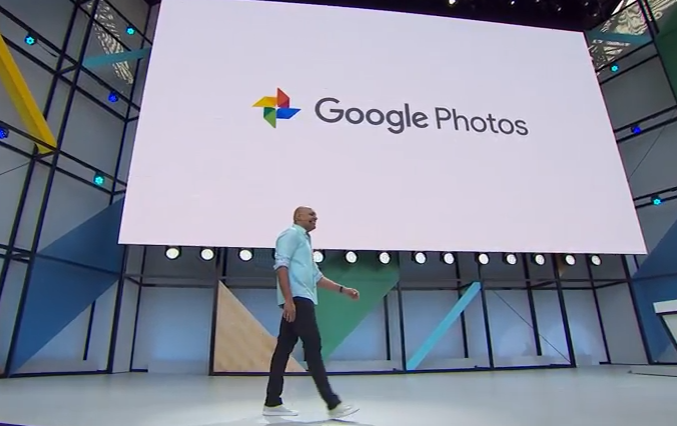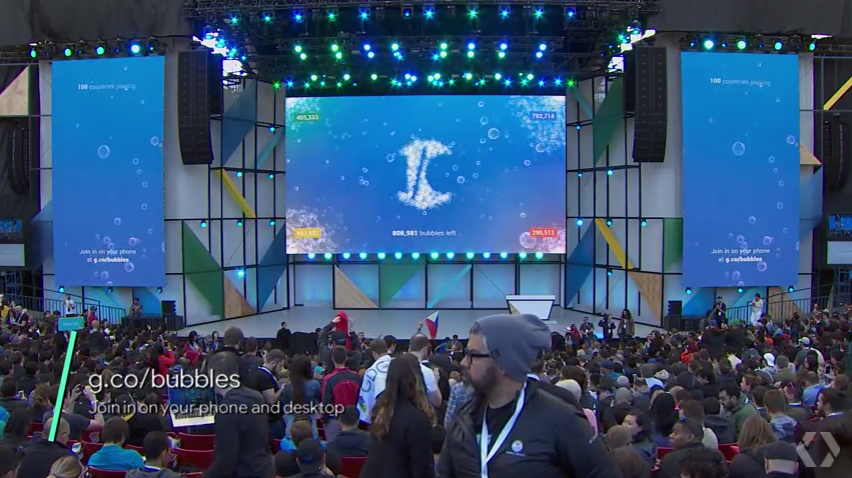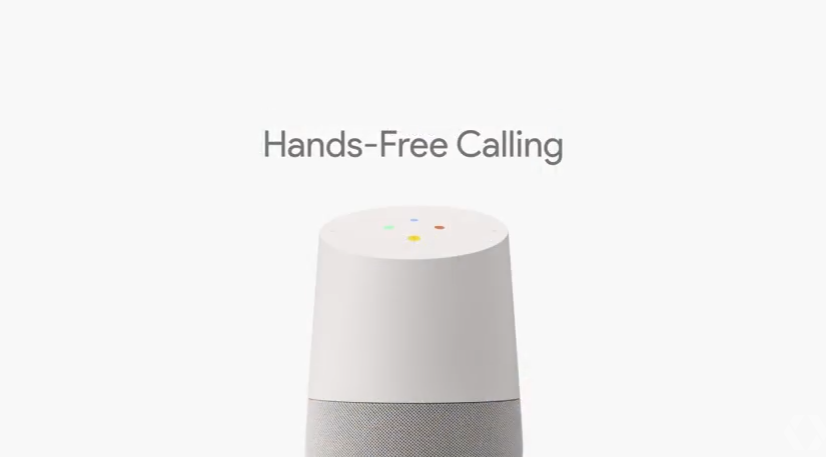Google I/O 2017: Our focus has now shifted from a mobile first approach to an AI first one, Sundar Pichai
05:30AM Thu 18 May, 2017

May 18,2017
California - Google I/O, the search giant’s annual developer conference was kicked off with the announcement of a fundamental shift in the company’s focus. Google CEO Sundar Pichai announced that the company will now move from a mobile first approach to an AI first one.
Artificial Intelligence or AI is already the corner stone of many of the most incredible updates to everyday technology that’s redefining the way we interact with our devices. Pichai’s announcement is, in a way, only stating the obvious. A technology company in 2017 that doesn’t focus on AI and machine learning (ML) in 2017 is headed nowhere.
“We’ve been focussed ever more on our core mission of organising the world’s information,” said Pichai. He adds, “We approach it by applying deep computer science and technical insights to solve problems at scale.”
 Pichai points out that a mobile first approach fundamentally redefined Google’s approach to products because interaction had to be reimagined; factors like multi-touch, location, identity, etc., had to be taken into account. With AI, Pichai believes that the same thing is happening again.
“In an AI first world, we’re rethinking all our products, and applying machine learning to solving user problems,” says Pichai.
In the course of the keynote, Google gives us examples of how AI is fundamentally changing the way we interact with technology. Before mobile devices, we interacted with computers using a keyboard and mouse. Mobile devices brought touch input. Today, voice and vision are fast replacing even touch.
Pichai points out that a mobile first approach fundamentally redefined Google’s approach to products because interaction had to be reimagined; factors like multi-touch, location, identity, etc., had to be taken into account. With AI, Pichai believes that the same thing is happening again.
“In an AI first world, we’re rethinking all our products, and applying machine learning to solving user problems,” says Pichai.
In the course of the keynote, Google gives us examples of how AI is fundamentally changing the way we interact with technology. Before mobile devices, we interacted with computers using a keyboard and mouse. Mobile devices brought touch input. Today, voice and vision are fast replacing even touch.
 If you think about it, our interactions with computers are actually getting more natural and immersive. This is, of course, impossible to achieve without machine learning. A conversational interface, for example, is not possible without an underlying system (AI) that can actually interpret and respond conversationally.
Speaking on the progress that Google has made in the fields of vision and voice recognition, Pichai indicates that Google’s image recognition algorithms are now more reliable than humans and that errors in speech recognition have fallen dramatically.
All of Google’s products are being updated with support for these new modes of interaction, and these are in turn powered by AI.
If you think about it, our interactions with computers are actually getting more natural and immersive. This is, of course, impossible to achieve without machine learning. A conversational interface, for example, is not possible without an underlying system (AI) that can actually interpret and respond conversationally.
Speaking on the progress that Google has made in the fields of vision and voice recognition, Pichai indicates that Google’s image recognition algorithms are now more reliable than humans and that errors in speech recognition have fallen dramatically.
All of Google’s products are being updated with support for these new modes of interaction, and these are in turn powered by AI.
 In the course of the keynote, Google unveiled a number of products that thoughtfully meld machine learning with voice input and image recognition.
Some of these updates include Google Lens, a platform that will use AI to bring augmented reality (AR) and advanced image recognition capabilities to over two billion Android devices, updates to the way Google Photos organises and shares images, Smart Replies in Gmail, updates to Google Home and a lot more besides.
The future of Google is AI, and I/O 2017 will show us how the foundation for that is being laid.
Stay tuned for more information on Google I/O 2017 and all that was unveiled at the event.
In the course of the keynote, Google unveiled a number of products that thoughtfully meld machine learning with voice input and image recognition.
Some of these updates include Google Lens, a platform that will use AI to bring augmented reality (AR) and advanced image recognition capabilities to over two billion Android devices, updates to the way Google Photos organises and shares images, Smart Replies in Gmail, updates to Google Home and a lot more besides.
The future of Google is AI, and I/O 2017 will show us how the foundation for that is being laid.
Stay tuned for more information on Google I/O 2017 and all that was unveiled at the event.
 Pichai points out that a mobile first approach fundamentally redefined Google’s approach to products because interaction had to be reimagined; factors like multi-touch, location, identity, etc., had to be taken into account. With AI, Pichai believes that the same thing is happening again.
“In an AI first world, we’re rethinking all our products, and applying machine learning to solving user problems,” says Pichai.
In the course of the keynote, Google gives us examples of how AI is fundamentally changing the way we interact with technology. Before mobile devices, we interacted with computers using a keyboard and mouse. Mobile devices brought touch input. Today, voice and vision are fast replacing even touch.
Pichai points out that a mobile first approach fundamentally redefined Google’s approach to products because interaction had to be reimagined; factors like multi-touch, location, identity, etc., had to be taken into account. With AI, Pichai believes that the same thing is happening again.
“In an AI first world, we’re rethinking all our products, and applying machine learning to solving user problems,” says Pichai.
In the course of the keynote, Google gives us examples of how AI is fundamentally changing the way we interact with technology. Before mobile devices, we interacted with computers using a keyboard and mouse. Mobile devices brought touch input. Today, voice and vision are fast replacing even touch.
 If you think about it, our interactions with computers are actually getting more natural and immersive. This is, of course, impossible to achieve without machine learning. A conversational interface, for example, is not possible without an underlying system (AI) that can actually interpret and respond conversationally.
Speaking on the progress that Google has made in the fields of vision and voice recognition, Pichai indicates that Google’s image recognition algorithms are now more reliable than humans and that errors in speech recognition have fallen dramatically.
All of Google’s products are being updated with support for these new modes of interaction, and these are in turn powered by AI.
If you think about it, our interactions with computers are actually getting more natural and immersive. This is, of course, impossible to achieve without machine learning. A conversational interface, for example, is not possible without an underlying system (AI) that can actually interpret and respond conversationally.
Speaking on the progress that Google has made in the fields of vision and voice recognition, Pichai indicates that Google’s image recognition algorithms are now more reliable than humans and that errors in speech recognition have fallen dramatically.
All of Google’s products are being updated with support for these new modes of interaction, and these are in turn powered by AI.
 In the course of the keynote, Google unveiled a number of products that thoughtfully meld machine learning with voice input and image recognition.
Some of these updates include Google Lens, a platform that will use AI to bring augmented reality (AR) and advanced image recognition capabilities to over two billion Android devices, updates to the way Google Photos organises and shares images, Smart Replies in Gmail, updates to Google Home and a lot more besides.
The future of Google is AI, and I/O 2017 will show us how the foundation for that is being laid.
Stay tuned for more information on Google I/O 2017 and all that was unveiled at the event.
In the course of the keynote, Google unveiled a number of products that thoughtfully meld machine learning with voice input and image recognition.
Some of these updates include Google Lens, a platform that will use AI to bring augmented reality (AR) and advanced image recognition capabilities to over two billion Android devices, updates to the way Google Photos organises and shares images, Smart Replies in Gmail, updates to Google Home and a lot more besides.
The future of Google is AI, and I/O 2017 will show us how the foundation for that is being laid.
Stay tuned for more information on Google I/O 2017 and all that was unveiled at the event.











